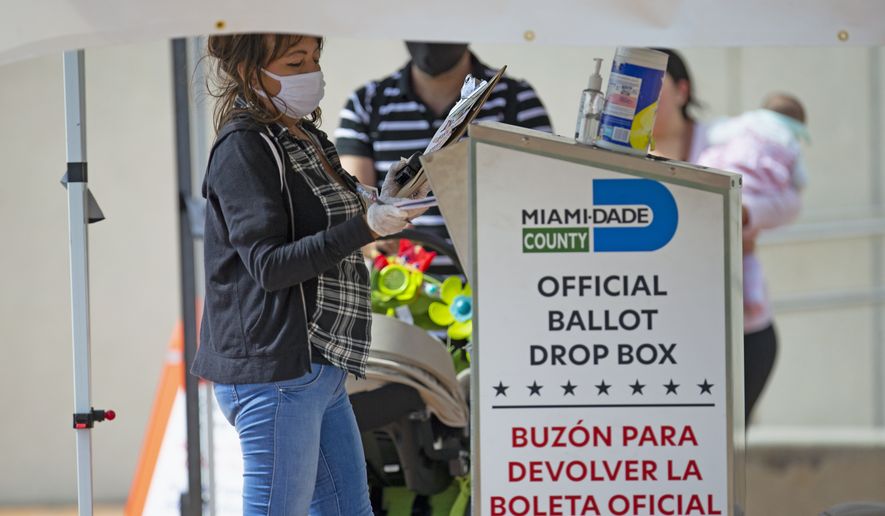A federal judge on Thursday struck down portions of Florida’s new election law, siding with liberal groups opposed to the restrictions on drop boxes for mail-in ballots and third-party voter registration.
U.S. District Judge Mark Walker declared most of the law unconstitutional. He wrote that voting rights in the U.S. are “under siege” because of racial gerrymandering of congressional districts.
In his ruling, which will be appealed before a more conservative federal court, Judge Walker took the unusual step of imposing a 10-year ban on any changes to Florida’s election law without “pre-clearance” from the court.
“Florida has repeatedly, recently and persistently acted to deny Black Floridians access to the franchise,” Judge Walker wrote. “This court also finds that pre-clearance would prevent future violations.”
Judge Walker tossed out limits on when ballot drop boxes could be used. The law allowed drop boxes to be located only at early-voting sites and the offices of election supervisors. It also limited the use of drop boxes during the early voting period and required full-time monitoring of drop boxes.
The 288-page ruling is the first successful challenge in federal court to new election laws in 19 Republican-led states and is part of a partisan showdown over how Americans vote. The rules for casting ballots have become a fight between what Democrats call “voting rights” versus what Republicans call “election integrity.”
Supporters of the laws from the Republican-run Florida Legislature said the changes were aimed at preventing voter fraud related to unsupervised and widespread use of drop boxes for absentee ballots.
Judge Walker, appointed to the bench by President Obama, said the Florida Legislature has a history of discrimination against Black voters. He said he found the rules for drop boxes “will disparately impact Black voters” by reducing the number of drop boxes, which he said Black voters are more likely to use.
The judge also rejected rules barring people other than poll workers from interacting with voters waiting in line, such as those who hand out food or water, and he tossed out restrictions on where and when third-party groups can deliver new voter registration forms.
The judge did not uphold a challenge to identification and annual renewal requirements for mail-in ballots.
Gov. Ron DeSantis, a Republican, said the law significantly strengthened voter integrity in Florida. He said he anticipated Judge Walker would side with the left-leaning groups trying to block the law based on the court’s prior decisions.
“This is a judicial equivalent of pounding the table, and I think it was performative partisanship,” Mr. DeSantis said at a press conference. “I think that that’s going to be reversed on appeal. The only question is how quickly it gets reversed on appeal, but it’s not going to be able to withstand scrutiny.”
Mr. DeSantis signed the legislation, passed in the Senate as S.B. 90, in May. It was immediately challenged in court by voting rights and civil rights organizations, including the NAACP Legal Defense and Educational Fund and the League of Women Voters of Florida, which said the rules would make it harder to vote and were intended to curb Blacks and other minorities from casting ballots.
“Today’s decision is a huge win for Florida voters,” said NAACP Legal Defense Senior Counsel Amia Trigg. “This decision recognized that S.B. 90 is the latest stain in a long history of voting laws which restrict Black political participation. As Judge Walker acknowledged, this is part of a larger assault on voting rights that continues across the country.”
State Rep. Anna V. Eskamani, the founder of the far-left advocacy group People Power for Florida, called the decision “a big deal” and said Judge Walker’s ruling “speaks to the decades of voter suppression and subversion pursued by the Republican Party in federal and state elections.”
Florida is among 19 Republican-led states that have recently passed laws bolstering voter identification and tightening restrictions on when and where voting can occur.
Most of the changes were enacted after the 2020 election, when states and election officials loosened voting laws and massively expanded mail-in voting to accommodate health and safety concerns during the COVID-19 pandemic.
Florida House Speaker Chris Sprowls, a Republican, called Judge Walker’s ruling “a 288-page accusation of discriminatory intent based on limited analysis of data he thinks the Legislature might have had, the uncritical and complete acceptance of the comments of Democratic lawmakers, and a total disregard for other viewpoints.”
• Seth McLaughlin contributed to this report.
• Susan Ferrechio can be reached at sferrechio@washingtontimes.com.




Please read our comment policy before commenting.